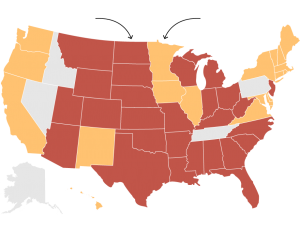Just as I began a four-week unit on climate change in my SUST 340 Policy, Law, & Ethics course here at Roosevelt (see pdf of syllabus) and in a space of just five days this past week, seismic quakes within the landscape of the US Supreme Court have shaken the nation’s fragile commitment to combating climate change by reducing carbon emissions and underscored the increasingly high political stakes of a tumultuous presidential campaign year.

As reported this past Wednesday, 10 Feb 2016, by the NY Times, “The Supreme Court’s surprise decision Tuesday to halt the carrying out of President Obama’s climate change regulation could weaken or even imperil the international global warming accord reached with great ceremony in Paris less than two months ago, climate diplomats say” (par. 1).
Journalist Coral Davenport goes on to note that “The court did not block the rule permanently, but halted it from being carried out in the states until legal challenges against it have been decided, a process that could take a year or more. Legal experts said the justices’ decision to stop work on the rule before any court had decided against it was unprecedented and signaled that the regulation might ultimately be overturned. That could set back the United States’ climate efforts for years, although there would still be a chance for Washington to meet its commitments by 2025″ (par. 5).
Then, just a few days after this split 5-4 vote on this unprecedented stay, the Supreme Court was thrown into unexpected uncertainty by the sudden death of its longtime conservative firebrand, Justice Antonin Scalia, who passed away on Saturday at age 79, thus immediately igniting a political firestorm over the process for filling the Court’s vacancy within the context of the impending presidential election.
 Tuesday we begin our three-week discussion of Naomi Klein’s 2014 book, This Changes Everything: Capitalism vs. the Climate.
Tuesday we begin our three-week discussion of Naomi Klein’s 2014 book, This Changes Everything: Capitalism vs. the Climate.
With the already-tempered enthusiasm of the recent Paris climate accord now battered by these latest upheavals on the US political and legal landscape, it’s hard to imagine a more timely and important conversation to be having right now in our universities and communities.